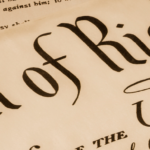Can police use text messages as evidence in a criminal case?
In state and federal prosecutions, the government relies heavily on evidence obtained from cell phone and social media sources, including text messages.

Police can use text messages as evidence in a criminal case.
Many people charged with felony or misdemeanor criminal charges or individuals defending Personal Protection Orders inquire about the availability of text or SMS messages as evidence for or against them. This type of digital evidence is rarely available to the defendant or law enforcement without a court order requiring a cell phone company to preserve the evidence. A common tactic used by police investigators is falsely claiming that they’ve procured text messages to use as evidence. These lies are unutilized to trick a suspect into making an admission or incriminating statement.
Despite the lack of availability of this type of evidence today, there is a push to force cell phone companies to store text messages for use in criminal and civil court proceedings. According to an article on CNET, the Major Cities Chiefs Police Association (MCC), and other law enforcement organizations, have urged Congress to require that wireless providers store text messages for at least two years. However, the MCC notes on its website that no specific time period was requested.
Text Messages Can Be Taken Out of Context
How many times have you texted someone, and they misunderstood your text? How many times have you misunderstood a text message sent to you? Tone, sarcasm, and joking in text messages can easily be misunderstood. Sometimes, people text using inside jokes or terminology with nuances only familiar to their closest friends and family. When police officers or government agents obtain text message conversations, they commonly misinterpret the communications. Because people tend to see what they want, police see evidence of crimes even when the “evidence” only exists because of a misinterpretation or misunderstanding.

Digital Evidence is Commonly Used in State and Federal Prosecutions
Because of the increasing popularity of text and instant messaging, the government believes that a wealth of evidence may be available in text messages and other digital communication. The cnet.com article cites one study which estimated that over 6 billion text messages are sent daily in the U.S. Text messages are also increasingly significant in civil and criminal cases.
The various wireless providers historically have had widely differing policies for retaining text messages. For example, as of 2010, AT&T, Cingular, T-Mobile, and Sprint did not retain the content of text messages. Verizon kept the content for five days, and Virgin Mobile kept the content for 90 days. The providers did keep the metadata, such as the phone numbers, for more extended periods, ranging from 90 days to 18 months. The inability to obtain older text messages can present a challenge for the government when building a case or the defendant’s lawyer when crafting a winning defense strategy.
“Do the police need a warrant to search a cell phone?”
With minimal exceptions, the police must have a warrant to search a cell phone for evidence, such as text messages. Under the Fourth Amendment, individuals have a right to be free of unreasonable searches and seizures. If law enforcement officers find evidence they believe is incriminating during a warrantless search, a skilled defense lawyer will file an aggressive Motion to Suppress Evidence and seek suppression and dismissal of any illegally discovered “evidence.”

A Great Criminal Defense Attorney Can Help
If you are charged with or suspected of a misdemeanor or felony offense, and there is text message evidence, please do not hesitate to call LEWIS & DICKSTEIN, P.L.L.C. If you call for a free consultation, you will speak with a criminal defense specialist who will take the time to evaluate your case and determine what options may exist to help you. The counties where using digital evidence by state and federal law enforcement is most common include Oakland County, Wayne County, Livingston County, Washtenaw County, and Macomb County.
Call us today at (248) 263-6800 for a free consultation or complete an online Request for Assistance Form. We will contact you promptly and find a way to help you.












